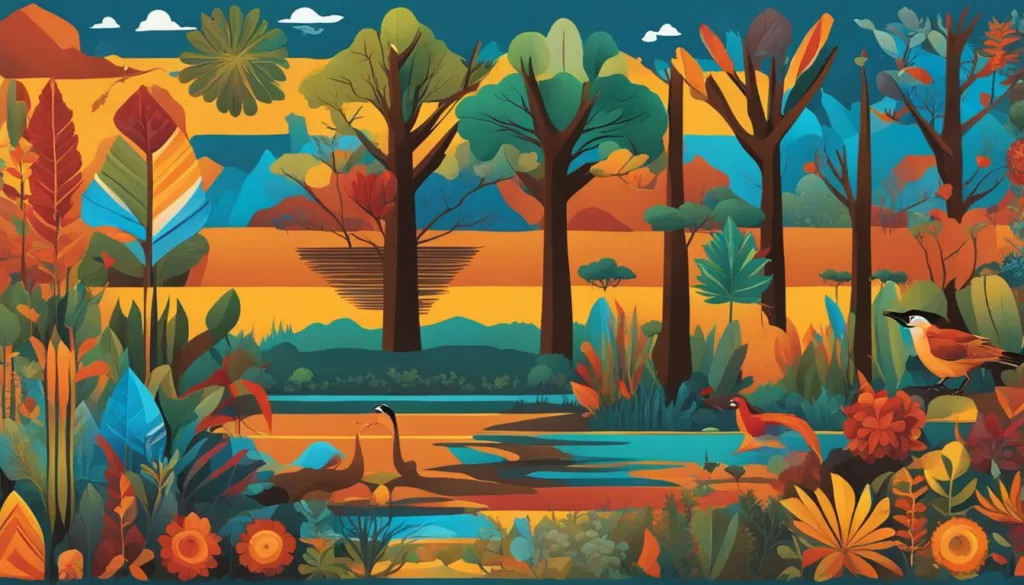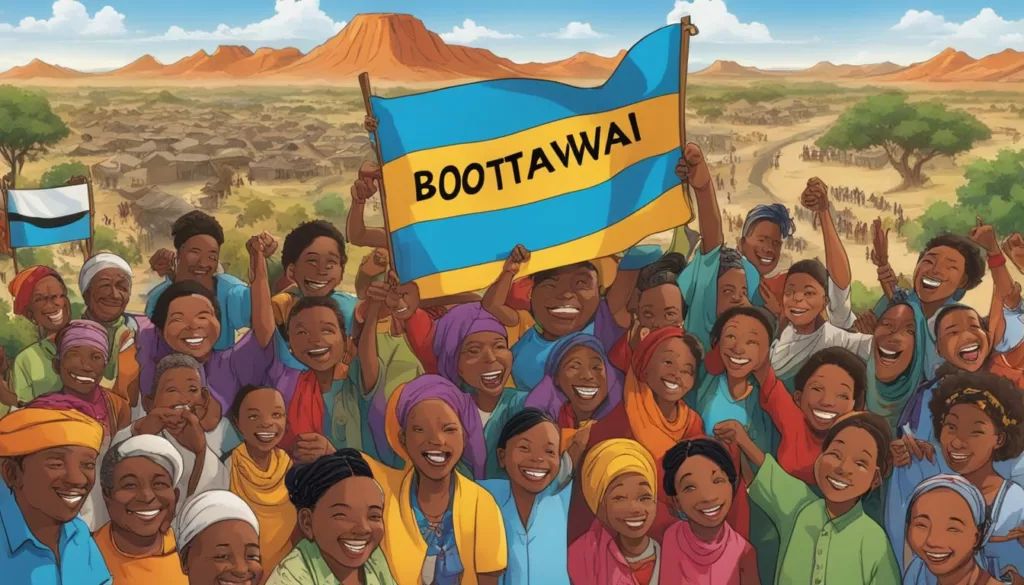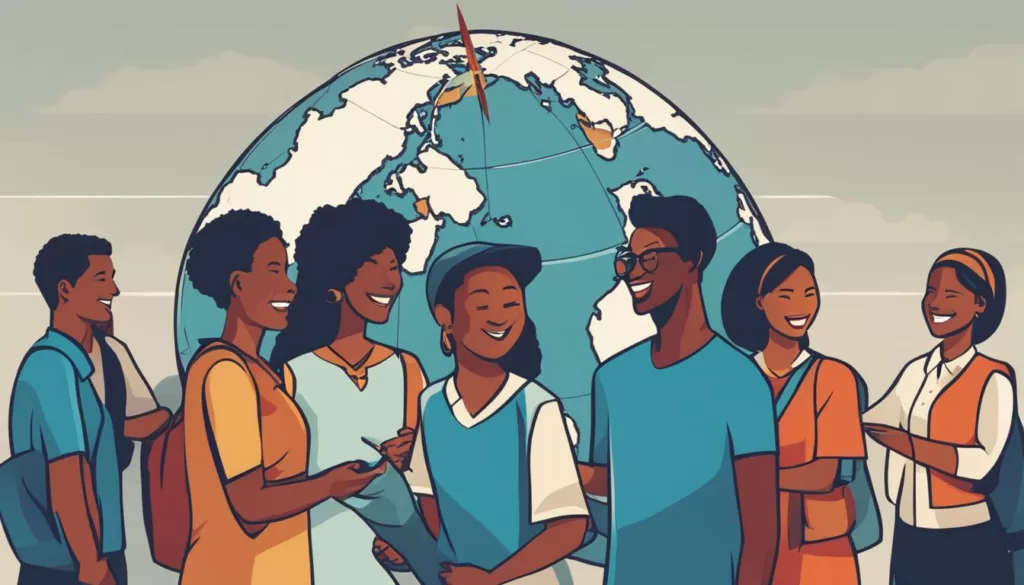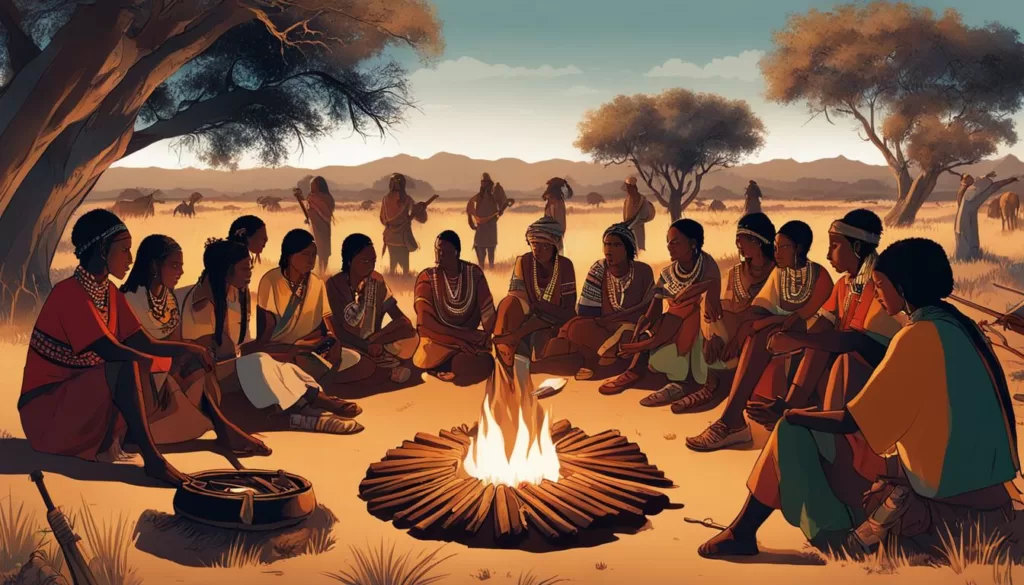Steeped in a rich historical context, Botswana stands as a testament to the enduring power of language and its ability to shape national identity. Within its borders lies a linguistic tapestry, as colorful and intricate as the traditional textiles found in its markets. Here, the languages spoken in Botswana are not merely a means of communication but are emblematic of the nation’s diverse cultural fabric. From the business transactions conducted in fluent English to the daily exchanges in Setswana, Botswana’s language diversity contributes to its unique character within the southern African region.
Key Takeaways
- Botswana’s rich linguistic tapestry includes English as the official language and Setswana as the national language.
- A mosaic of over 20 smaller languages highlights the exceptional language diversity Botswana offers.
- English plays a crucial role in official business and acts as a bridge in international relations.
- Languages spoken in Botswana reflect the nation’s cultural heritage and social dynamics.
- There exists a pressing need to address the concerns of language endangerment and preserve the linguistic variety for future generations.
- Understanding Botswana’s languages contributes to a deeper appreciation of its people and their history.
The Linguistic Landscape of Botswana
Botswana, a country celebrated for its linguistic diversity, offers an array of languages that paint a vivid picture of its cultural richness. The official language, English, serves as a linchpin in governmental and educational contexts, while Setswana, the national language, resonates with the collective voice of the Batswana people. This section delves into the fascinating interplay of language families in Botswana, highlighting the vibrancy of its linguistic heritage.
The nation’s dedication to fostering its array of languages is evident in the recognition of minority tongues such as Kalanga and Kgalagadi. These, along with other languages like Shona, are a testament to the intricate fabric of Botswana linguistic diversity. The presence of foreign languages and sign languages, including Portuguese and American Sign Language, adds an international dimension to Botswana’s linguistic landscape.
| Language Family | Language | Percentage of Speakers* |
|---|---|---|
| Bantu | Setswana | 77% |
| Bantu | Kalanga | 7.4% |
| Bantu | Kgalagadi | 3.4% |
| Non-Bantu | Tshwa | 2.1% |
| Tuu | !Xóõ | 0.1% |
*Data serves as a representative sample rather than exact figures.
Exploring the assortment of indigenous tongues within Botswana, we encounter thirty-one living languages. Of these, a combination of indigenous and non-indigenous languages co-exist, though some face threats of extinction. It is not merely the speech that is diverse but also the language families in Botswana that include Bantu, Khoisan, and more, thereby shaping the nation’s linguistic identity.

- The Bantu family boasts the widest reach, with Setswana predominating as a linguistic cornerstone.
- Other Bantu languages such as Kalanga and Kgalagadi portray the internal diversity within this family.
- The Khoisan group, though less common, offers unique linguistic features and sounds that are rare in other languages.
- Languages from the Tuu family, like !Xóõ, echo the ancient legacies of Botswana’s first inhabitants.
As we navigate through Botswana’s linguistic landscape, it is this multiplicity of languages that enriches the societal narratives and reflects the adaptability and endurance of its people. This linguistic environment, vibrant and dynamic, continues to evolve as it embraces the nuances of its existing and emergent voices.
Languages Spoken in Botswana: From Official to Indigenous Tongues
Botswana, a nation with a rich cultural makeup, boasts an intricate linguistic landscape that reflects its history and diversity. As a former British protectorate, the official language Botswana adopted from its colonial past is English, establishing a universal medium for administration, instruction, and global engagement. However, a closer look reveals a broader dialogue reflecting the nation’s soul, where the Setswana language and other indigenous languages of Botswana narrate a story of tradition, community, and resilience.
English: The Official and Business Language
In Botswana, English is not only the lens through which legal and governmental lenses are focused; it also facilitates the push towards socioeconomic development. It pervades every aspect of Botswana’s formal interfaces, from the pulsating business districts in Gaborone to the hallowed halls of academic institutions. This lexical backbone supports Botswana’s rise on international platforms allowing participation in discourse and decision-making on a worldwide scale.
Setswana: The National Language with a Widespread Influence
The heart of Botswana’s national identity is encapsulated in the Setswana language. Setswana is the native tongue of many, serving both as a daily communicative tool and a cultural cornerstone. Its prevalence demonstrates not only its role as a national language but also its function as a unifying force within the Batswana community. With nuanced prefixes indicative of social constructs, Setswana’s ubiquity underlines its profound impact on the country’s collective consciousness.
Indigenous and Minority Languages Thriving in Botswana
The mosaic of indigenous languages Botswana harbors is an affirmation of its multicultural ethos. Outside the sphere of English and Setswana, languages such as Kalanga, Kgalagadi, and others flourish. These languages, echoed across varying topographies from the vast Kalahari to the lush Okavango, not only provide the tapestry of Botswana’s linguistic landscape but also symbolize the country’s commitment to cultural integrity and linguistic inclusivity. Diverse ethnic groups continue to communicate their histories, beliefs, and innovations through these treasured vernaculars, ensuring that their ancestral voices resonate into the future.

Botswana’s commitment to its linguistic heritage is commensurate with its dedication to embracing the ebbs and flows of cultural dynamics. In balancing the official with the indigenous, Botswana champions a national narrative that is as multifaceted as its celebrated diamond mines—brilliant, resilient, and distinctly Botswanan.
Grasping the Linguistic Diversity: The Role of Minority Languages
Botswana’s mosaic of cultural expression is richly colored by the presence of over 20 minority languages Botswana, each serving as a unique spectrum of the nation’s historical and cultural narrative. Amongst these are languages such as Kalanga, Kgalagadi, and Tswapong, which might resonate in lesser frequencies compared to the national tongue Setswana but are indispensable threads in the texture of Botswana’s identity.

While English and Setswana dominate the linguistic scene, these minority languages form vital undercurrents shaping the daily lives and preserving the lore of various ethnic communities. The country’s staunch language preservation efforts are a beacon of hope for the survival and revitalization of these precious tongues that stand on the brink between legacy and oblivion.
- Language preservation efforts Botswana aim to breathe new life into these vernaculars, ensuring that their unique phonetic and syntactic patterns are passed down to subsequent generations.
- Documentation, education, and technological inclusion serve as modern-day tools in safeguarding the linguistic inheritance of Botswana’s minority groups.
- Innovations such as digitizing oral traditions, and incorporating these languages into school curricula and media platforms are part of a strategic approach to language conservation.
- Cultural festivals and literary works are equally encouraging the continued use of these languages, nurturing a sense of pride among speakers.
The collective endeavor to preserve the linguistic diversity of Botswana not only strengthens societal cohesion but also enriches the global tapestry of human expression. By safeguarding these minority languages, Botswana champions the cause of cultural and linguistic pluralism, reinforcing the nation’s standing as a guardian of linguistic diversity.
| Language | Classification | Number of Speakers | Preservation Initiatives |
|---|---|---|---|
| Kalanga | Bantu | Small, but significant | School programs, Literature |
| Kgalagadi | Bantu | Minority | Cultural festivals, Radio broadcasts |
| Tswapong | Bantu | Minority | Community workshops, Oral history projects |
| !Xóõ | Tuu | Critically endangered | Linguistic documentation, Ethnographic research |
The language preservation canvas of Botswana is vast and continues to extend its reach, with relentless ambition to portray each linguistic portrait in its full splendor. It is a nation that proudly echoes a motto of unity in diversity, spearheading efforts that whisper tales of the past into the ears of the present and future.
English in Botswana: A Tool for International Communication
Since Botswana’s transition from a British protectorate to a sovereign nation, the English language has played a pivotal role in its evolution. Establishing itself as more than a linguistic remnant of colonial times, English in Botswana has become an essential instrument for governance, education, and international diplomacy. Its widespread use within the educational system Botswana continues to refine, solidifying the country’s position within the global community.
From Colonial Times to Modern Day Usage
Traversing the timeline from the colonial era to present-day Botswana, English has undergone significant transformation. It has shifted from being the language of the colonizer to becoming a strategic asset in the country’s development. The language evolution Botswana witnesses today is a product of both historical circumstance and a deliberate push towards modernity and globalization. English, with its rich history within the nation, acts as a bridge connecting Botswana to the wider world, laying a firm foundation for international communication and commerce.

The Educational System and English Proficiency
The backbone of Botswana’s linguistic competency in English is its educational system. Starting from elementary schooling to higher education, English is emphasized as the medium of instruction, underpinning academic and professional advancement. This focus ensures that Batswana youth are fluent in a language that opens doors to international opportunities and facilitates engagement in global discourse. The bilingual education policy bolsters proficiency in both English and Setswana, nurturing a linguistically adept citizenry capable of seamless navigation between local and global stages.
By investing in English education, Botswana reinforces its commitment to creating pathways that lead its populace towards impactful international interactions. The ability to communicate effectively in English is viewed not just as a skill but as a necessary component in driving forward national pursuits in technology, science, business, and cultural exchange.
Botswana’s stance on English in the educational system exemplifies its dedication to linguistic excellence and global integration. This, in turn, cements its reputation as a country that values cross-cultural communication, making profound strides in education, and expanding its international horizons.
Language Evolution: Threats to Botswana’s Linguistic Heritage
The cultural fabric of Botswana, celebrated for its eclectic mix of tongues, faces a tide of change that threatens to leave some of its linguistic threads frayed—caught in the vortex of language extinction Botswana knows too well. Socio-economic development, globalization, and the hegemonic ascendancy of dominant languages have brought many of Botswana’s indigenous languages to a precarious brink, necessitating urgent action towards indigenous language preservation Botswana has recently prioritized.

In an effort to better understand the scope of this challenge, authorities and linguists have identified languages within the borders of Botswana that are on the verge of silence. The Demographics of Language Endangerment in Botswana, as the table is aptly named, narrates the startling facts we confront:
| Language | Status | Estimated Number of Speakers |
|---|---|---|
| !Xóõ | Critically Endangered | Less than 4000 |
| Tswapong | Vulnerable | Tens of thousands |
| Kgalagadi | Definitely Endangered | Quarter of a million |
The Danger of Language Extinction
Language extinction in Botswana is not merely a loss of words but the erosion of worldviews, traditions, and irreplaceable knowledge. It is the silencing of ancestral voices and the dissipating echo of history. With each language that fades away, a unique perspective on human existence and our connection to Botswana’s lands and heritages is forever lost.
Preservation Efforts for Botswana’s Indigenous Tongues
Faced with the stark reality of linguistic eradication, concerted efforts for indigenous language preservation Botswana are instrumental in safeguarding these cultural keystones. Organizations, both local and international, have catalyzed projects aimed at revitalizing these languages—be it through recording lexicons, crafting learning materials, or integrating them into community initiatives and education systems. Resolute in the pursuit of cultural perpetuity, the guardians of Botswana’s linguistic treasury labor to ensure the flame of these ancient tongues never extinguishes.
- Community-driven programs collaborate with elders to document linguistic nuances and oral histories.
- Educational reforms seek to introduce young Batswana to their linguistic ancestry, fostering bilingual and trilingual proficiencies.
- Technology integration, such as language apps and digital platforms, provides accessible resources for learning and engaging with endangered languages.
The vibrancy of Botswana’s linguistic heritage hinges on these interventive strategies. As symbiotic elements of cultural and natural biodiversity, the languages of Botswana not only embody ecological wisdom but are also a testament to human creativity and endurance. In the realm of language conservation, Botswana strives to serve as a beacon—a hope that the kaleidoscope of its voices will continue to resonate for epochs to come.
Conclusion: Celebrating the Cultural Heritage and Linguistic Tapestry of Botswana
In the heart of Southern Africa, Botswana’s linguistic identity is an ornate reflection of its rich and multifaceted cultural landscape. The nation’s commitment to nurturing its linguistic tapestry—a tremendous blend of the official English language with indigenous tongues such as Setswana—speaks volumes of its dedication to cultural heritage. Amidst the evolving demands of modern communication, Botswana remains anchored to its roots, weaving a narrative that is both timeless and distinctively Botswanan.
This linguistic tapestry of Botswana is not merely about colloquial speech; it is about the cultural heritage Botswana has long cherished, representing a nation’s history, values, and spirit. As global influences permeate, the drive to maintain this diversity is a testament to Botswana’s resilience and respect for its traditions. The country’s proactive approach to language preservation showcases an admirable balance between progress and the appreciation of historical narratives.
As we have journeyed through the language landscapes of Botswana, we’ve seen a relentless pursuit to protect and promote this linguistic heritage. The resonance of each word spoken in Setswana, alongside the melodic cadences of other indigenous languages, weaves an intricate and vibrant cultural tapestry. It is through this collective linguistic expression that Botswana stands as a paragon of cultural identity, celebrated not just in Africa, but also on the global stage. In uniting its voices, Botswana offers the world a lesson in diversity, inclusivity, and the enduring power of language.
FAQ
What languages are spoken in Botswana?
Botswana is a linguistically diverse nation with English as the official language and Setswana as the national language. In addition to these, there are over 20 minority languages spoken across the country, including Kalanga, Kgalagadi, and Tswapong, among others. This forms the linguistic tapestry of Botswana.
What is the official language of Botswana and why?
English is the official language of Botswana. It was inherited from the colonial era and is used in government, business, and education as the primary medium of written communication and official transactions. This has helped Botswana maintain connections with the global community.
How prevalent is Setswana language in Botswana?
Setswana is the national language of Botswana and is spoken by a majority of the population. It is a Bantu language and serves as an essential cultural identifier for Batswana. Setswana’s influence extends beyond everyday communication to include societal norms and traditions, identified with prefixes that signify various societal aspects.
What are some of the indigenous and minority languages thriving in Botswana?
While Setswana and English dominate the linguistic landscape, Botswana also has a rich spectrum of indigenous languages that are actively spoken. These include Kalanga, Kgalagadi, and indigenous sign languages like the American Sign Language, which is used by members of the deaf community. Each language contributes to the country’s cultural richness and heritage.
Why are minority languages important in Botswana?
Minority languages in Botswana are critical for maintaining the cultural and linguistic diversity of the nation. They represent the heritage and identity of various ethnic groups. As such, language preservation efforts in Botswana are not only about saving languages but also about protecting cultural identities.
How has English evolved in Botswana since colonial times?
Since Botswana’s independence from British colonial rule, English has played a pivotal role in the nation’s development. It has become a central tool for international communication and business, and its use in the education system has facilitated the emergence of a bilingual population proficient in both local and global contexts.
What is being done to preserve indigenous languages in Botswana?
Recognizing the threat to its linguistic heritage, Botswana has instigated various initiatives aimed at preserving indigenous languages. These include supporting educational programs that teach and promote these languages, encouraging their use in media and public life, and documenting them for future generations.
What threatens the linguistic heritage of Botswana?
The linguistic heritage of Botswana faces threats from globalisation, urbanisation, and the resultant socioeconomic changes that lead to the dominance of English and Setswana. These factors contribute to a decrease in the number of speakers of indigenous languages, posing the risk of language extinction.






